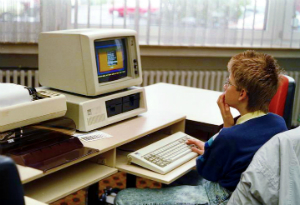Charity calls for education shake-up to respond to the digital revolution
- Emma Finamore
- 09 May 2016
Up to 15 million jobs are at risk if the UK’s education system does not adapt to the digital world, the chair of an education charity has warned.

Lord Kenneth Baker, of the Edge Foundation, is calling for radical action to prepare young people for the next industrial revolution in a new report.
The report – The Digital Revolution – was prompted by the Bank of England’s prediction that up to 15 million jobs are at risk of automation across the UK economy including professions such as law and accountancy.
Baker’s eight-point plan includes providing 3D printers and design software for all primary schools, reintroducing young apprenticeships at 14, blending a core academic curriculum with a day a week of technical learning and regular work experience and letting young people take computer science or design and technology instead of a foreign language GCSE.
”The economy is changing at an unprecedented pace. Every day, jobs are being lost in professions we used to regard as careers for life,” the Edge Foundation chair said.
“Artificial intelligence, robots, 3D printing and driverless vehicles will impact on sectors as varied as the legal profession, transport and construction.”
Baker thinks the UK’s future workforce will need technical expertise in areas such as design and computing, as well as skills that robots cannot replace – flexibility, empathy, creativity and enterprise.
“Right now, this thinking is almost entirely absent from the core curriculum in mainstream schools,” he said.
“In the Digital Revolution, knowledge is as necessary as ever, but it is not enough. It has to be connected with the real world through practical applications ranging from engineering and IT to the performing, creative and culinary arts.
“We should not go back to a 19th century diet of academic subjects for all. We need 21st century education for a 21st century economy.”
Baker has set out an eight-point education plan that, he thinks, responds to the digital revolution:
- Primary schools should bring in outside experts to teach coding
- All primaries should have 3D printers and design software
- Secondary schools should be able to teach Computer Science, Design and Technology or another technical/practical subject in place of a foreign language GCSE
- The Computer Science GCSE should be taken by at least half of all 16 year olds
- Young apprenticeships should be reintroduced at 14, blending a core academic curriculum with hands-on learning
- All students should learn how businesses work, with schools linked to local employers
- Schools should be encouraged to develop a technical stream from 14-18 for some students, covering enterprise, health, design and hands-on skills
- Universities should provide part-time courses for apprentices to get Foundation and Honours degrees.
News
- BT is using virtual reality technology to recruit apprentices
- National Apprenticeship Week: graduate recruitment slows while more apprentices are hired
- 70% of young Brits have a ‘side hustle’
- The majority of UK teachers say their school’s careers service is “inadequate”
- Nearly Half of Young People Say They're Not Taught Essential Skills
- New app will encourage students to vote
- Essex Council to Hire Two New In-house Legal Apprentices
- Almost two thirds of the UK’s biggest employers are planning Degree Apprenticeships to coincide with the Apprenticeship Levy
- The UK is the only country that uses predicted grades for university admissions
- Law firm poised to launch first ever ‘Magic Circle’ legal apprenticeship